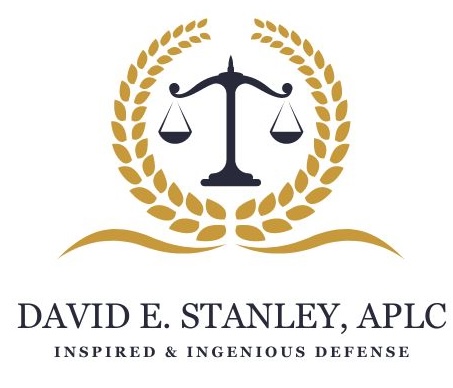Criminal Appeals | Federal and Louisiana Defense by David E. Stanley, APLC
Table of Contents
Toggle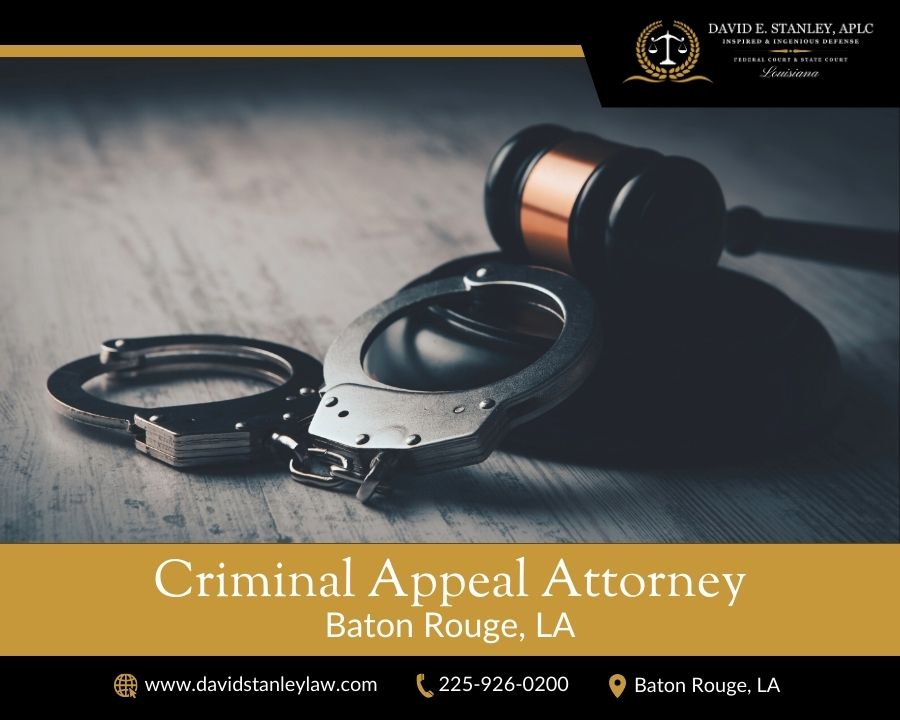
Sometimes, courts make errors. Juries may be swayed by emotion rather than evidence. Some witnesses have inaccurate recollections of what happened, or they give conflicting testimony. As a result, the admission of false testimony or unreliable evidence is possible. Regrettably, erroneous convictions can also result from false or malicious accusations. When that occurs, you need the help of a knowledgeable appeals lawyer to help you if you were wrongfully convicted.
David E. Stanley, APLC, will work hard for you to identify and correct the mistakes made in the trial court and ensure that the law is applied correctly in your criminal appeal. The time period within which an appeal must be filed to protect your rights is very short. Contact him now to schedule an appointment to learn how a criminal appeal attorney can help you!
What Types of Errors Should Be Appealed?
Structural Errors
A structural error is a defect that affects the framework within which the trial proceeds, rather than simply an error in the trial process itself. Structural errors taint the entire trial process and necessarily render a trial fundamentally unfair. They deprive the accused of the basic protections without which a criminal trial cannot serve its function as a reliable vehicle for the determination of the accused’s guilt or innocence.
The United States Supreme Court has found structural errors in only very limited categories of cases. Structural defects have been defined to include: the total deprivation of the right to counsel; the unlawful exclusion of grand jurors of defendant’s race; the denial of self-representation at trial; the denial of a public trial; and when a defective reasonable doubt instruction has been given by the trial judge to the jury. Importantly, a structural error may not be reviewed for harmless error. In other words, a structural error is never a harmless error.
Trial Errors
Trial error occurs during the presentation of the case to the jury, or to the judge alone in a non-jury trial. Trial errors may be assessed by the appellate court in the context of the other evidence to determine whether its admission at trial is harmless beyond a reasonable doubt. So, for example, the erroneous introduction of evidence of other crimes allegedly committed by the accused is a trial error, which may be assessed with all of the other evidence to determine whether its admission was harmless beyond a reasonable doubt. In cases in which other crimes evidence is erroneously admitted, this trial error is subject to harmless error analysis. Trial errors that are found to be harmless are not a valid basis upon which to reverse the trial verdict on appeal. However, trial errors determined not to be harmless by the appellate court will result in a reversal of the defendant’s conviction or sentence.
Errors Patent
An error patent is an error that is discoverable by a mere inspection of the pleadings and proceedings and without inspection of the evidence. For example, a violation of a defendant’s right against double jeopardy is considered to be an error patent.
6 Factors to Consider When Choosing a Criminal Appeal Attorney
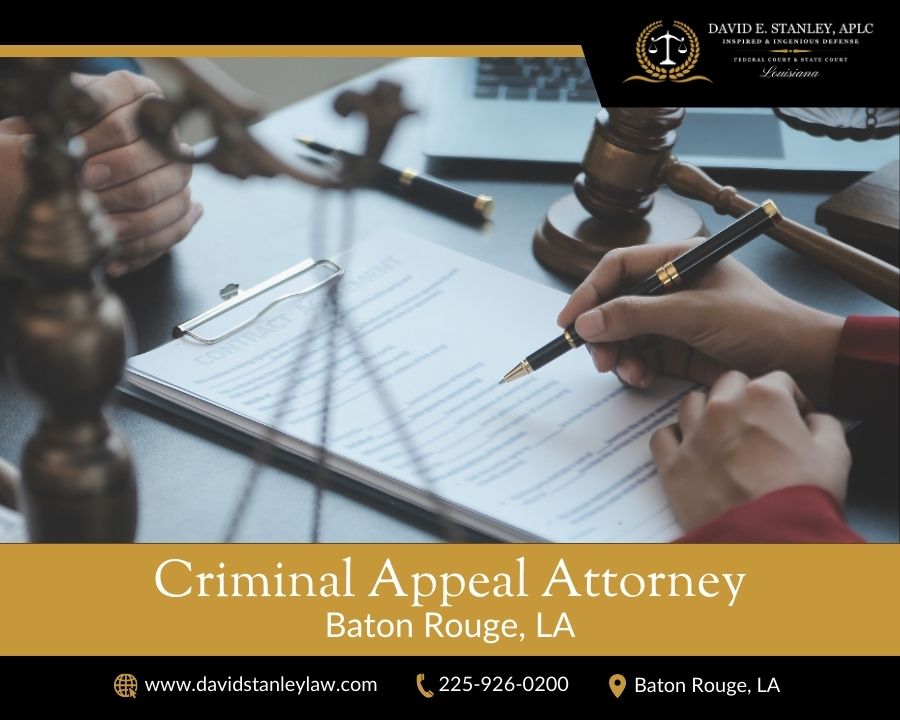
You have the right to appeal a criminal conviction or sentence if you have been found guilty, or pled guilty, and have been sentenced. Intricate procedural rules determine the deadline and format for filing your appeal. You have a short and limited amount of time to find and hire a qualified criminal appeals attorney. How do you pick a trustworthy lawyer to handle your case? You have a lot on the line. Your criminal appeal is your opportunity to get your conviction or sentence overturned.
You should consider these factors when selecting an attorney for your appeal.
1. Hire a Professional Who Focuses on Appellate Litigation
You may have been represented during your trial by a top-notch trial attorney that you selected and retained, or by the public defender, or you may have elected to represent yourself. However, criminal appeals require the services of a lawyer who has a different set of skills and an extensive knowledge of appellate law and procedure. Ideally, the trial attorney and appellate lawyer work together as a team to improve the chances of winning the appeal.
Before you consider an appeal, you need to clearly understand two important points about your appeal. First, a judgment or ruling will not be reversed by an appellate court because of any error, defect, irregularity, or variance which does not affect substantial rights of the accused. Second, the grounds for your appeal must be based on what is in the trial record concerning what happened during your trial.
With some exceptions, even if errors occurred during your trial, they must have been properly preserved for appeal. Typically this is done by an objection made by your lawyer at the time that the error occurred. In Louisiana, there is a contemporaneous objection rule. It provides that an irregularity or error cannot be availed of after verdict unless it was objected to at the time of occurrence. In trials in which there is more than one defendant, if an objection has been made by one of the defendants on trial, it is presumed, unless the contrary appears, that the objection has been made by all the defendants. Also, the requirement of an objection does not apply to the court’s ruling on any written motion.
2. Knowledge
Is the appellate lawyer knowledgeable about the area of criminal law that applies to your case? Criminal law involves several sub-specialties, a large number of separate crimes, and a multitude of distinct legal issues. Hiring such a criminal trial attorney makes perfect sense in the trial court. However, you want to hire a lawyer for your criminal appeal with extensive knowledge of the procedural and substantive law that applies to the specific issues in your particular criminal case. The deadlines to file and perfect your appeal, the applicable procedural rules, and standards of review on appeal can differ dramatically from case to case. Sometimes, framing the issues on appeal to get more favorable standards of review in the court of appeal, can make a huge difference in the outcome. To get the ideal outcome, look for an attorney with the required knowledge of appellate law and procedure. Select an attorney for your appeal that focuses on criminal appeals, and who has a proven track record of success in the appellate courts.
3. Experience
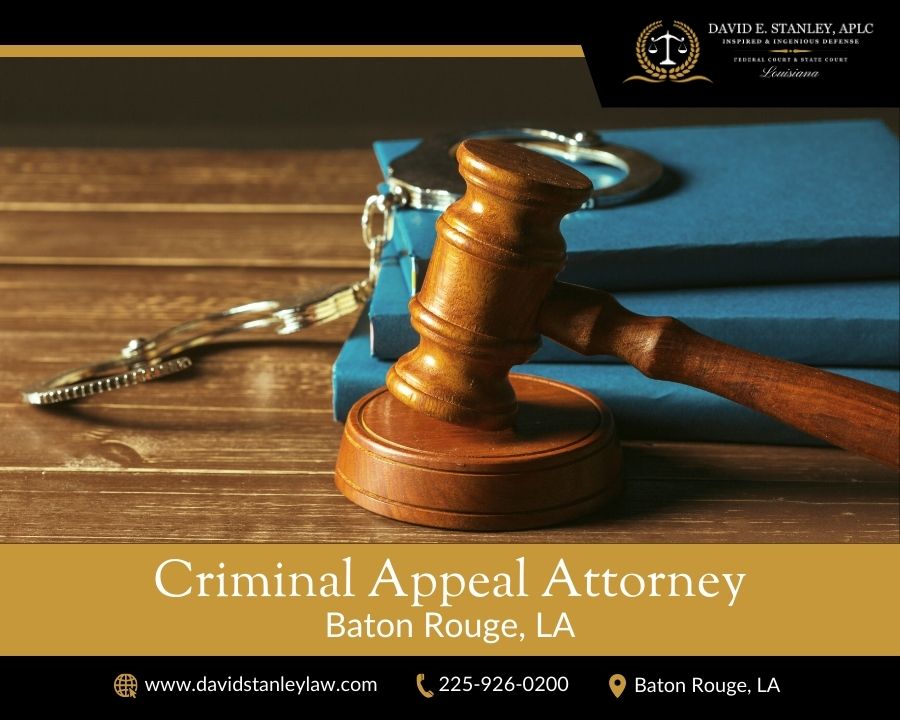
Does the lawyer you are considering have the necessary experience and knowledge in appealing cases similar to your case? It would help if you hired an attorney with experience in appeal work. Such experience, knowledge, and a proven track record of success demonstrates that the lawyer you decide to hire understands which strategies and tactics are most likely to result in a favorable outcome in your criminal appeal.
4. Dedication
Is the lawyer you are considering committed to your case, or do they treat you like a nameless and faceless file number? Will the attorney you are considering actually be the attorney who writes your briefs and orally argues your case in the court of appeal. Or will that attorney hand it off to a less knowledgeable and less experienced attorney. Your appeal deserves careful handling and attention to the important details. Employing a lawyer that only takes on a limited number of appellate cases at any given time will increase the likelihood that your lawyer’s concentration is focused on you and your case.
5. Resources
Does the lawyer that you select have the resources necessary to investigate, research, and pursue your appeal? The law firm that you select to handle your appeal must have the necessary resources at its disposal to properly review your case to increase the possibility that your appeal will be successful.
6. Energy
Is the lawyer energetic and enthusiastic concerning your case on appeal? Do they have the energy, enthusiasm, and desire to carefully review the record to identify, develop, and present errors that affected your substantial rights to the court of appeal for correction and relief?
Benefits of Hiring An Appeal Lawyer
Here are some of the benefits of hiring an appellate lawyer:
1. Focused Attention
Every appeal requires a careful review of the trial record, careful research and analysis of the relevant legal principles, focus, energy, creativity, and extensive time and effort. A careful review of the trial record is very time consuming. The appellate lawyer must concentrate primarily on the facts and legal issues in the case that will most likely change the outcome of the trial or reduce the sentence imposed. The successful resolution of multiple issues may require more of the attorney’s time in order to affect the outcome. David E. Stanley, APLC will fully focus and concentrate on all of the important issues while adhering to all case deadlines.
2. Appeal Knowledge
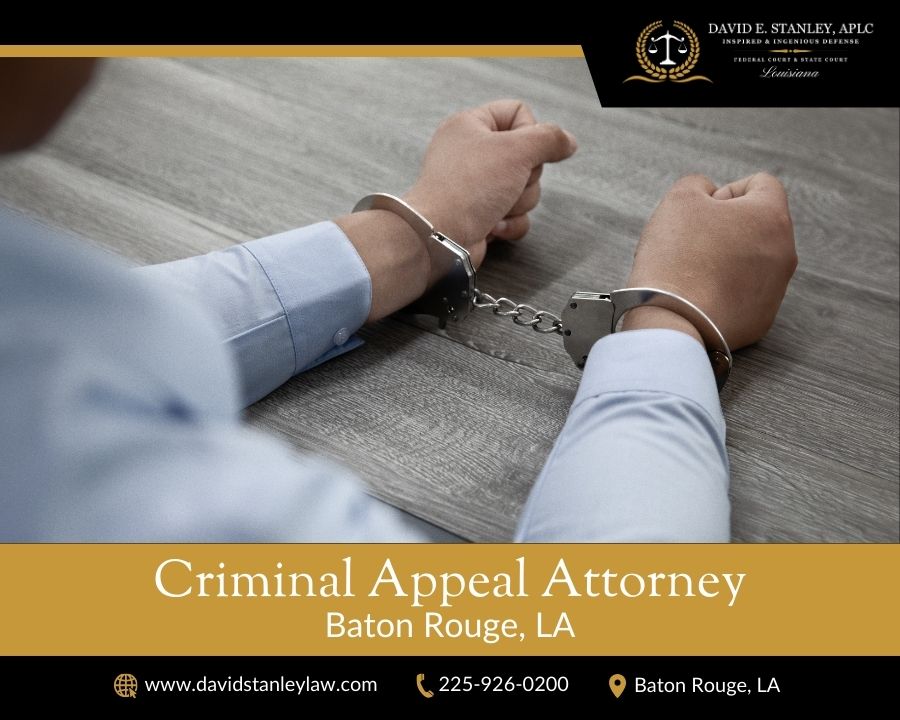
As with everything else, the more knowledge, training, and experience your appellate lawyer has, the greater the likelihood that you will prevail in court. There is no denying the value of the knowledge and experience that David E. Stanley brings to your criminal appeal, which will greatly benefit your case and increase the likelihood of achieving the desired outcome.
3. Review of the Trial Record
4. The Appellate Standards of Review
5. Knowledge of Law
David E. Stanley, APLC is up to date on, and has a firm command of, the concepts. issues, and trends in appellate law and procedure. He is very familiar with the uniform rules of appellate procedure and local rules of the courts of appeal in Louisiana. In addition, his extensive review of the trail record, knowledge of the law, and attention to detail, will be of great benefit during the oral argument of your case to the court of appeal.
6. Efficient and Cost-Effective
7. Experience Orally Arguing You Case to the Appellate Court
Oral argument is more art than science. You need to retain a lawyer skilled in oral argument with experience making oral arguments in the court of appeal and in the Supreme Court. Ask your lawyer if he has ever argued and won a case before the Louisiana Supreme Court. Ask your lawyer when he last made an oral argument in the Court of Appeal. Ask your lawyer if he stays up to date on appellate practice.
Frequently Asked Questions:
When Can I File An Appeal?
Ordinarily, you can file an appeal after you have been convicted and sentenced. In Louisiana state court, you usually have thirty (30) days from the date of sentencing to file a notice or request for appeal.
Suppose you are in Louisiana state court and want to raise a specific issue before a conviction and sentence have been handed down. In that case, you must seek a writ of supervisory review with the relevant appellate court. In addition, you would submit an interlocutory appeal to a federal court. Not every matter is eligible for a supervisory writ or interlocutory appeal. Find out if, when, and how you can appeal a decision you want to contest by speaking with a seasoned criminal appeals attorney about your particular case.
What Sort of Issues Can Be Raised in An Appeal?
The issues that can be raised in an appeal are errors that would have likely changed the outcome of the trial, or reduced the sentence. These are not harmless errors. These types of errors are usually the grounds for a successful appeal.
The most common issues which result in relief on appeal are legal errors (as opposed to errors of fact). Errors of law are mistakes made in applying the law to the facts of your case.
These legal mistakes include, for example, denying a well founded motion to suppress evidence, refusing to sever offenses or parties for trial, or giving a jury instruction that is an incorrect statement of the law over defense counsel’s objection.
Does a Person Have To Serve Their Sentence While On Appeal?
A person does not always have to serve their sentence while on appeal. Sometimes, you can remain out on bail while you appeal your conviction and sentence. The imposition of sentence can in some circumstances, be suspended while your appeal is pending. After sentence and until final judgment, bail will be allowed if a sentence of five years or less has actually been imposed. Bail may be allowed after sentence and until final judgment, in the discretion of the trial judge, if the sentence actually imposed is imprisonment for more than five years, except when the court has reason to believe, based on competent evidence, that the release will pose a danger to others or to the community, or that there is a substantial risk that the person may flee.
Reliable Federal and Criminal Appeal Attorney
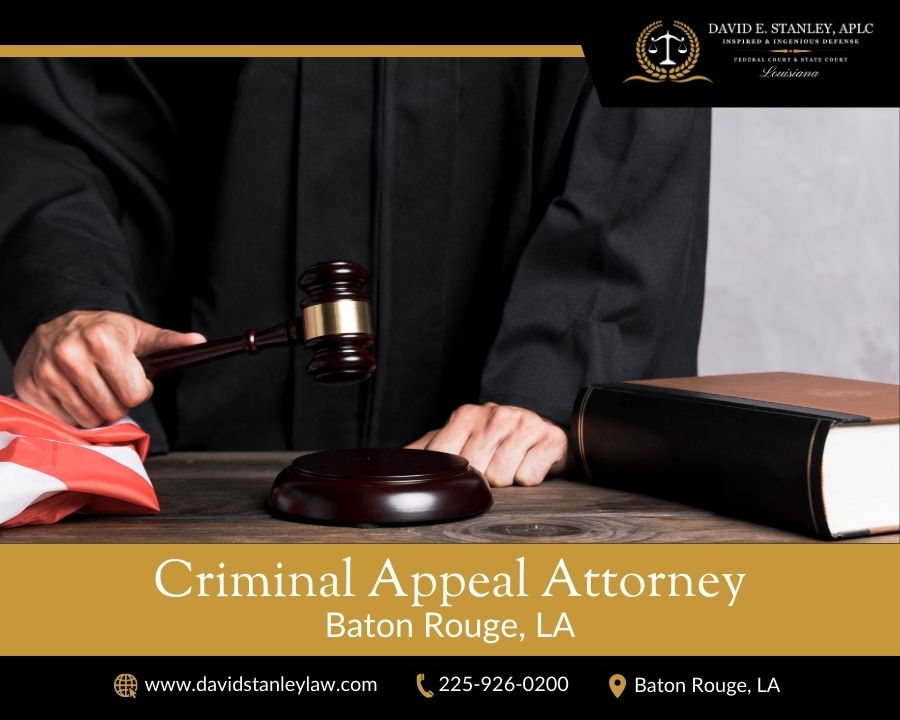
David E. Stanley, APLC has spent nearly forty years representing clients in criminal appeals. This experience not only means that he is knowledgeable about the in and outs of the legal system, but he is also familiar with the requirements and preferences of the various courts of appeal. He also knows how prosecutors often brief and argue issues on appeal. He understands, and can often anticipate, the arguments that prosecutors will likely make and how to counter them. It is simpler to construct an appellate strategy that gives you the highest chance of victory when you consider this occasionally neglected and frequently underappreciated information at the very beginning stages of the appeal.
Looking for a Criminal Defense Attorney? David E. Stanley, APLC is a seasoned and trusted criminal defense attorney who can help and guide you through your legal battle. We serve the following areas:
Criminal Defense Attorney Ascension Parish, LA
Criminal Defense Attorney Baker, LA
Criminal Defense Attorney Baton Rouge, LA
Criminal Defense Attorney Central City, LA
Criminal Defense Attorney East Baton Rouge Parish, LA
Criminal Defense Attorney East Feliciana Parish, LA
Criminal Defense Attorney Greenwell Springs, LA
Criminal Defense Attorney Iberville Parish, LA
Criminal Defense Attorney Lafayette Parish, LA
Criminal Defense Attorney Livingston Parish, LA
Criminal Defense Attorney Pointe Coupee Parish, LA
Criminal Defense Attorney Pride, LA
Criminal Defense Attorney St. Tammany Parish, LA
Criminal Defense Attorney Tangipahoa Parish, LA
Criminal Defense Attorney West Baton Rouge, LA
Criminal Defense Attorney West Feliciana Parish, LA
Criminal Defense Attorney Zachary, L
David E. Stanley, APLC
1055 Laurel St #2, Baton Rouge, LA 70802, United States
225-926-0200

